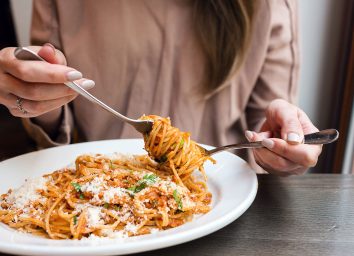The Wrong Amount of Carbs to Eat Every Day, Says Dietitian

If you are trying to lose weight, manage your blood pressure, or just live a healthy lifestyle, figuring out how many carbs you should eat each day can be easier said than done. One person says to eat carbs all day every day, while another person will imply that this macro is one of the worst things on this earth that you can eat. Which leaves you scratching your head wondering whether eating an apple is going to save your life or if it is going to be the death of you.
Among the sea of advice surrounding how many carbs is ideal, there is one amount that is the wrong amount: zero carbs. As a registered dietitian, I always recommend that zero carbs are the wrong amount of carbs to eat every day, no matter what the diet trends on social media tells you. (Related: 30 Worst Things You Can Do If You’re Trying to Lose Weight.)
Why are carbs important?
Carbohydrates, affectionately known as carbs, are what our body uses primarily as fuel and energy. While it is true that the body can break down fat and protein for energy too, leaning on carbs can be a much more efficient way to fuel your body.
Foods that contain carbs are also the best sources of fiber – which can help keep your bowel movements healthy, can support a healthy gut microbiome, and can promote satiety after a meal. Not eating enough fiber is linked to some unsavory outcomes, including an increased risk of colon cancer and a higher likelihood of experiencing constipation.
Carbohydrates can also help maintain muscle mass. While it is true that protein is the shining star macro in the muscle-building world, if your body is not getting any carbs, your muscles can be broken down and used as energy.
Read more: 26 Worst Habits Slowing Your Metabolism, Says Science
Why are zero carbs the wrong among of carbs to eat every day?
Even if you are following a diet that is notoriously low in carbs – think keto or Atkins, as examples – you will be hard-pressed to find a diet that is 100% carb-free. Even hard-core keto allows for some carbs every day, such as low-carb fruits.
If you are eliminating carbs completely, you are inevitably eliminating entire food groups. From fruit to whole grains to even milk, eating “no carbs” means that you are essentially living off of protein and fat sources, and thus, missing out on some key nutrients (like fiber).
Eliminating food groups can be risky. As an example, eating fruit is linked to plenty of positive health benefits. From reducing the risk of depression to decreasing the changes of experiencing a heart attack or stroke, including fruit into a diet is utterly important.
Perhaps the most frightening outcome that people may experience when they eat a low amount of carbs (or no carbs) is an elevated risk of experiencing early death along with an elevated risk of developing cancer and experiencing stroke, according to data shared by the European Society of Cardiology.
In a nutshell, completely eliminating carbs from your diet is a risky move.
Bottom Line
There are valid reasons why people may follow a low-carb diet, and studies have shown that these diets can provide people with some amazing results. But eating absolutely no carbs is a dangerous game to play. When you completely eliminate carbs from your diet, you are cutting out entire food groups, and therefore may cause you to run the risk of being deficient in some very important nutrients, or worse, cause you to experience some scary health effects.
Instead of eliminating carbohydrates altogether, consider focusing on unrefined carbs that are nutrient-rich and can help support your overall health. From berries to whole grain bread to beans and peas, the healthy carb choices are endless and each one is more satisfying than the next. For some examples, see these 24 Best Healthy Carbs To Eat For Weight Loss.
For more healthy eating news, make sure to sign up for our newsletter!








